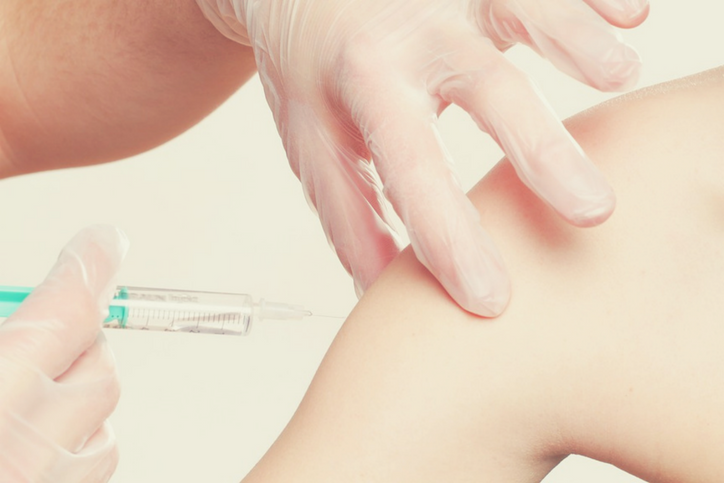(Translated by Google) Good service and kindness Edith is a very kind person (Original) Buena atención y amabilidad Edith es una persona muy amable
Read More
Which STDs Have Vaccines?
Posted: Nov 27th, 2017 at 12:00AM

According to the American Sexual Health Association, one of every two sexually active persons will have an STD by the time they reach the age of 25 years old. In total, the Centers for Disease Control and Prevention says that approximately 20 million new STDs happen every year; and half of the people dealing with them are between the ages of 15 and 24. Most young people don't get tested, even though STDs can lead to infertility, and the total cost every year due to STDs in this country comes out at around $16 billion. Education is the best defense, and knowing which STDs are preventable by vaccination is essential in protecting your health and wellbeing.
What is an STD?
A sexually transmitted disease is an illness that people pass to one another through unprotected sexual acts — including mere skin-to-skin contact, as well as intravenous drug use. There are 30 kinds of viruses, bacteria, and parasites that can cause STDs, and unfortunately, most people will experience some kind in their lifetime.
STDs can be deceiving because they're not always obvious; and, despite what some people think, all it takes is one sexual partner, and one sexual experience, for a person to become infected. For this reason, education, prevention, and treatment (if necessary) are paramount.
STD Prevention
It goes without saying that the best STD prevention is abstinence, which means you refrain from engaging in every kind of sex. If you do choose to have sex, then limiting the number of people you sleep with or staying in a monogamous physical relationship can help reduce the risk of contracting a sexually transmitted disease.
Condoms are another form of STD prevention. Although they don't eliminate the risk completely, when used properly, male and female condoms can greatly decrease your chance of getting an STD. Finally, you can get vaccinated for certain STDs. Vaccines are a safe, effective way to protect yourself from diseases. Which STDs have vaccines, though? Although the landscape is changing, currently, the vaccines available to treat STDs are still relatively limited.
The HPV Vaccine
Human Papillomavirus, or HPV, is the most common STD, affecting around 79 million Americans, mostly in their early 20s and younger. It comes in more than 100 strains. If left untreated, some of these strains could potentially cause cervical cancer in women or oropharyngeal cancer in both sexes.
 HPV is tricky to spot because an infected person might show no symptoms. Furthermore, you could develop your own symptoms years after having sex with someone who is carrying it, potentially making it difficult — or impossible — to figure out who gave it to you in the first place. While not every strain can be prevented by vaccinations, some can; you should consider getting yourself vaccinated.
HPV is tricky to spot because an infected person might show no symptoms. Furthermore, you could develop your own symptoms years after having sex with someone who is carrying it, potentially making it difficult — or impossible — to figure out who gave it to you in the first place. While not every strain can be prevented by vaccinations, some can; you should consider getting yourself vaccinated.
The Hepatitis A Vaccine
Hepatitis A has been making headlines quite a bit lately, because our country is seeing the worst outbreak in years, particularly affecting the homeless community in San Diego. Hepatitis A is a type of liver disease. You've probably heard that it's most commonly contracted due to dirty food or water (which has likely been contributing to its rampant spreading as of late). While this is true, you can also contract it from certain sexual activities.
There is good news, though: hepatitis A is totally preventable when you get the vaccine, which consists of two shots administered six months apart.
The Hepatitis B Vaccine
Like hepatitis A, hepatitis B is also a liver disease. In this case, though, it's usually contracted through the exchanged of infected bodily fluids. You can also contract hepatitis B by sharing drug paraphernalia, and getting a tattoo with equipment that wasn't properly cleaned. You can receive this vaccine in a series of two, three, or four injections.

STDs That Don't Have a Vaccine
HPV, hepatitis A, and hepatitis B are currently the only three STDs that can be prevented by vaccines. Other sexually transmitted diseases, including gonorrhea, chlamydia, and syphilis, do not yet have a vaccine. This could be because there is already wide availability of treatments for infected people (like antibiotics), so vaccines haven't been as much of a priority as they might be for other diseases not easily treated.
However, humans are becoming so resistant to certain diseases, like gonorrhea, that vaccines might be available in the future. There are already other STD vaccines that are in development, too. For instance, science has been experimenting with a genital herpes vaccine since the 1930s. However, none of the vaccinations developed have yet been found to work well enough to be approved and licensed.
Researchers have also played with the idea of an HIV vaccine. Several vaccines have been tested in clinical trials, but none have been approved yet. Accomplishing this specific vaccine is incredibly difficult for several reasons. For starters, HIV can mutate very quickly, making it harder to pinpoint and protect against long-term. Secondly, HIV damages the immune system, but the vaccine must trigger the immune system to work. While preventative HIV vaccines have been developed to protect people from it, none have been approved by the FDA, and you need to be enrolled in a clinical trial to receive one.
How STD Testing Can Help
If you're sexually active, then STD testing is always a smart idea, and it's easier than you might expect, too. Testing for chlamydia and gonorrhea typically involves providing a urine sample. An HIV test will require a blood test or swabbing the inside of your mouth. Genital herpes and syphilis can both be done through a blood test; and if you'd like to get tested for HPV, you should start with a Pap test. Get tested regularly, no matter how healthy you think you are. Affordable testing has become so widely available - finding a center is easier than ever.
If you are interested in ordering an STD test — including a gonorrhea test or herpes testing — contact e7 Health today to request an appointment, or book an appointment online.

OMG, so e7 is one-of-a-kind in Vegas. My husband needed a TB Skin Test and I was able to book for the next hour. The staff actually answers the phone, right away. They are kind and nice. Upon arrival, at e7 Windmill location, the receptionist (who's name I do not have) was so kind, nice, and caring. She's a gem. During our brief wait for my husband's appointment, I witnessed the interaction between staff members and also, their clients. It's amazing that the entire, big e7 Team loves each other and what they do. You do not see this anywhere else. The team's interaction was magical. AND then how each staff member interacts with their patient, well... just unique. My husband had Alia, who definitely folded her Angel Wings in to fit in to the treatment room. What an amazing being. So patient, as my husband was on a walker and not so ambulatory. She explained all so clearly and easily. Truly, we have never experienced such CARE not just in Vegas, but anywhere. She also went above-and-beyond for us as to the next step. e7 scared me at first online, but now, they are my Go To and I have already recommended to many. God bless Alia and all. The Team truly LOVE what they do and it shows.
Read More

















